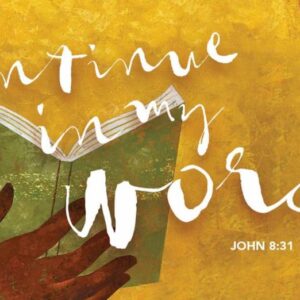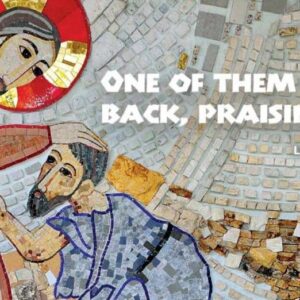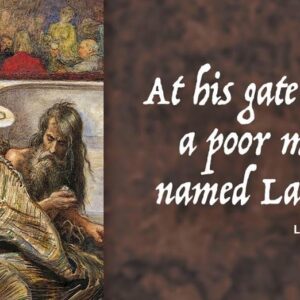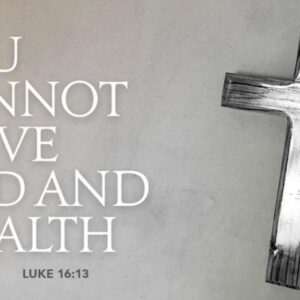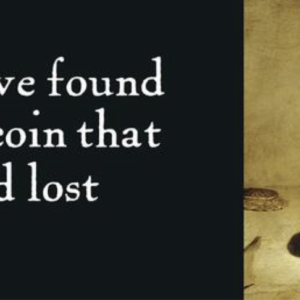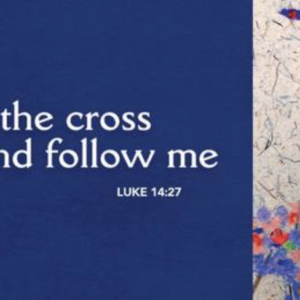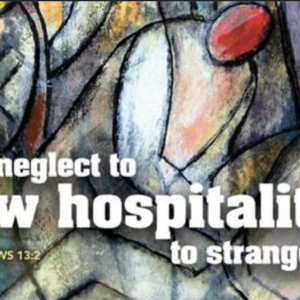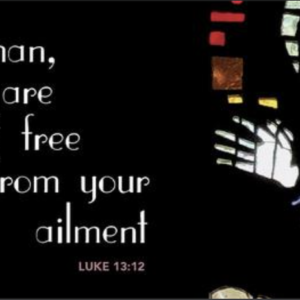Reformation Sunday
John 8:31-36
31 Then Jesus said to the Judeans who had believed in him, “When you continue in my word, you are truly my disciples; 32 and you will know the truth, and the truth will make you free.” 33 The Judeans answered Jesus, “We are descendants of Abraham and have never been slaves to anyone. What do you mean by saying, ‘You will be made free’?”
34 Jesus answered them, “Very truly, I tell you, everyone who commits sin is a slave to sin. 35 The slave does not have a permanent place in the household; the Son has a place there forever. 36 “So if the Son makes you free, you will be free indeed.”
————————
Please pray with me this morning, church:
Holy One,
You reform the church in every age,
And you call us to be ever-reforming people.
Be our refuge and stronghold in the midst of life’s tumults.
Strengthen us with the gifts of your Spirit.
And nurture and sustain us with your very self
For the work to which you are calling us.
Amen.
————————
Luther’s foundational Reformation hymn Ein Feste Burg or “A Mighty Fortress” was written between 1527 and 1529, 10 years after what we know as the beginning of the Protestant Reformation, but very much in the thick and in the muck of how this Reformation was coming about. Life was far from easy for Brother Martin. See, when you start making suggestions about how those in power should start using their power differently, those in power who want to stay in power don’t like you very much anymore and start trying to make your life incredibly difficult, even dangerous.
There are a handful of theories about when and why Luther composed this hymn, but what isn’t disputed is that Luther based it on the text of Psalm 46:
1 God is our refuge and strength,
a very present help in trouble.
2 Therefore we will not fear, though the earth be moved,
and though the mountains shake in the depths of the sea;
3 though its waters rage and foam,
and though the mountains tremble with its tumult.
4 There is a river whose streams make glad the city of God,
the holy habitation of the Most High.
5 God is in the midst of the city; it shall not be shaken;
God will help it at the break of day.
6 The nations rage, and the kingdoms shake;
God speaks, and the earth melts away.
7 The Lord of hosts is with us;
the God of Jacob is our stronghold.
You can hear why such words would be a tremendous comfort for Luther during such a contentious time.
A couple of weeks ago, at our Staff Meeting, I asked our Staff where they were finding refuge and strength these days, where did they find themselves turning for an unshakeable stronghold. Things like the outdoors or gardens, music, meditation, and family came up. These are the things that anchor us in times of difficulty. This place also came up…New Hope. Gathering together with you as God’s people to worship, pray, sing, fellowship, and share in a meal together…this, too, provides a touchpoint or a guidepost…an anchor, if you will…in the midst of some pretty hefty storms.
I wonder about for you, church? Where…or in whom…do you find refuge and strength? What…or who…is your stronghold?
Like Luther, in the midst of turmoil and difficulty, I wonder how many of us would respond with “God” right off the bat? That’s a convicting question for me, too, by the way, because I don’t know that “God” would always be the first words out of my mouth either.
There are some Lutheran pastors and preachers in recent years who are shying away from Reformation Sunday as a cause for celebration. Rather than a kind of Lutheran pep rally and a nostalgic pining for decades gone by, some find it more useful to remain firmly rooted in the present, asking the questions about how the reformed church can continually be reforming. And while I’ve never been one for pep rallies or certainly nostalgia without appropriate thoughtful and realistic reflection, I do think we can honor the gifts of the Protestant Reformation, and particularly the gifts of Lutheran theology, especially in a place and region where a Lutheran interpretation and lens isn’t necessarily a given. I mean, we’re split about 50/50 here at New Hope, those who were born into and grew up in the Lutheran church, and those who came to Lutheranism later in life…some of us much later, like in the past couple of years. And so a helpful reflection on some basic Lutheran theological understandings can be a really welcome and good thing.
Especially on a Sunday when we also celebrate a Confirmation.
— Congratulations, again, Joe. We’re very proud of you.
That’s what Confirmation is, really. A time of working out and figuring out what we mean by this word “Lutheran.”
I had a rather rude learning a couple of months ago. I knew that Lutherans weren’t the only ones who participated in Confirmation, right? Episcopalians, Methodists, and Presbyterians all have some version of Confirmation as well. But Lutherans, as I understand it, are really the only ones who make such a big deal out of it. I mean, Confirmation for Lutherans is like a 2 year process. Some churches stretch it out to a 3 year process…so, you know…you’re welcome, Joe. And to our other Confirmation students: you’re welcome.
But for like our Episcopalian and Methodist siblings, did you know Confirmation is only like a 2 week process? Yeah…some churches do a few evenings over a couple of weeks in the summer, and that’s the extent of their Confirmation learning. I mean, at first I was jealous, but then I was a little incredulous. “What do you mean 2 weeks? How could you possibly learn everything you needed to learn in just 2 weeks?”
Starting this year, we’ve also changed our process around Confirmation here at New Hope. Over the summer, Pastor Janelle and I sat down and we started with a conversation about what we hope to accomplish with Confirmation, what’s our goal. And pretty quickly, we arrived at a place where we understood that we’re interested more in formation than information. In regards to Confirmation, I’m less concerned with what you know, and more interested in how you come to understand and wrestle with your faith and how you can use it as a tool to help guide and ground you in your lifelong journey of discipleship going forward. Rather than being able to answer Lutheran trivia questions, my goal for our Confirmation students is to be able to say “Why does my faith matter? Who is this God, who is this Jesus…and how does my relationship with them have an impact and influence on my life?”
It’s why over the course of the year, you’ll hear me invite all of you to our Confirmation Retreats. We’ve got 4 times throughout the year, a couple of hours on a Sunday after worship, where we’re diving into Lutheran history, Lutheran theology, living a life rooted in Lutheransim, plus learning about Baptism and Communion. And the reason we’re opening these up and inviting all of you wonderful people is two fold: first, we believe that we have much more to learn from each other than we do siloed apart from one another, and two, maybe it’s been a while since you were Confirmed and you could use a refresher, or maybe you were never Confirmed and you want to know more about just what this whole Lutheran thing is all about. This is some what we’ll be tackling in these mini-retreats. And you are invited…encouraged…urged, even…to attend and participate.
Why does your faith matter?
Especially as we journey throughout our lives, having some place to return to when the inevitable storm arises is helpful. Your faith can be that stronghold, that anchor. God can be that refuge. At it’s best, the congregation, the community of faith, the gathered and assembled body of Christ can be and is your strength and fortress in the myriad of your life’s difficulties.
Because Lord knows life can be difficult. And in those moments it’s the love and care and compassion and generosity and forgiveness and grace shown to us by others that sustains us. A love, care, compassion, generosity, forgiveness, and grace we learned, by the way, from being recipients of those same gifts from God. We share only what we have been first given.
This is a theme that Joe reflected on in his final Confirmation project, a theme Joe lifted up from 1 John 4:19: “We love because God first loved us.” We only know how to love because we were first shown love by God, through Christ. Through the death and resurrection of Christ, God so fundamentally demonstrated God’s love for us, for all of humanity, that our whole lives are lived as a response to this incredible gift.
It’s a gift that we sometimes struggle to receive. Which puts us in good company, by the way, because it was one of Luther’s struggles, as well. One of Luther’s most serious wrestlings was with this idea that he could never be good enough to be seen as acceptable in God’s eyes.
Justification is this idea of “right relationship,” of being in good standing, in our relationship with God. Think of justification as in like alignment in a document or on a page, you can align to the right or to the left or to the center, and then there’s the justified alignment, where the left and the right sides are both aligned. This is justification, of being in correct alignment in our relationship with God.
Luther’s tortured wrestling is a mirror to our own. One of our greatest fears as humans when it comes to our relationship with the divine is that somehow we could never be seen as good enough or acceptable to God. And we come by this fear honestly. In all of our dealings with other people, our relationships tend to come with a set of expectations or a sense of quid pro quo, you do this for me and I’ll do this for you. Whether real or imagined, we believe that our relationships with other people are predicated on this idea that either you want something from me or you can do something for me.
In Romans, St. Paul writes that we have been justified with God through Christ. That through the faith, and the faithfulness, of Jesus, all of humanity has been put in this correct alignment, this right relationship with God. Through the crucifixion and resurrection of Christ, God is reconciling the entire world back to God’s own self. No longer do we have to worry about not being seen as good enough or acceptable to God, because through Christ, we are made to be in right and aligned relationship.
And it’s this gift that gets lived out in our relationships with others. It’s the church, the community of faith, that holds these gifts for and gives these gifts to one another. And it’s why your participation is so vital, church. Your presence here matters, deeply, because you are that refuge and strength, you are that stronghold, you are the body of Christ, the enfleshed embodiment of God, to and for someone else when they’re going through those tumultuous storms.
You wonder if your presence and involvement makes a difference? It does.
Look around you right now. See the faces of those who have held you during difficult times, look into the eyes of those who have promised to care for you and comfort you in all that is to come.
You are God’s gift to one another. The body of Christ.
Here at this font. Here at this table.
Here is your refuge. Here is your strength.
Celebrate that gift. Honor it.
God is with you, and you are here for each other.
That’s a truth, a freedom, and a gift that will never fail.

